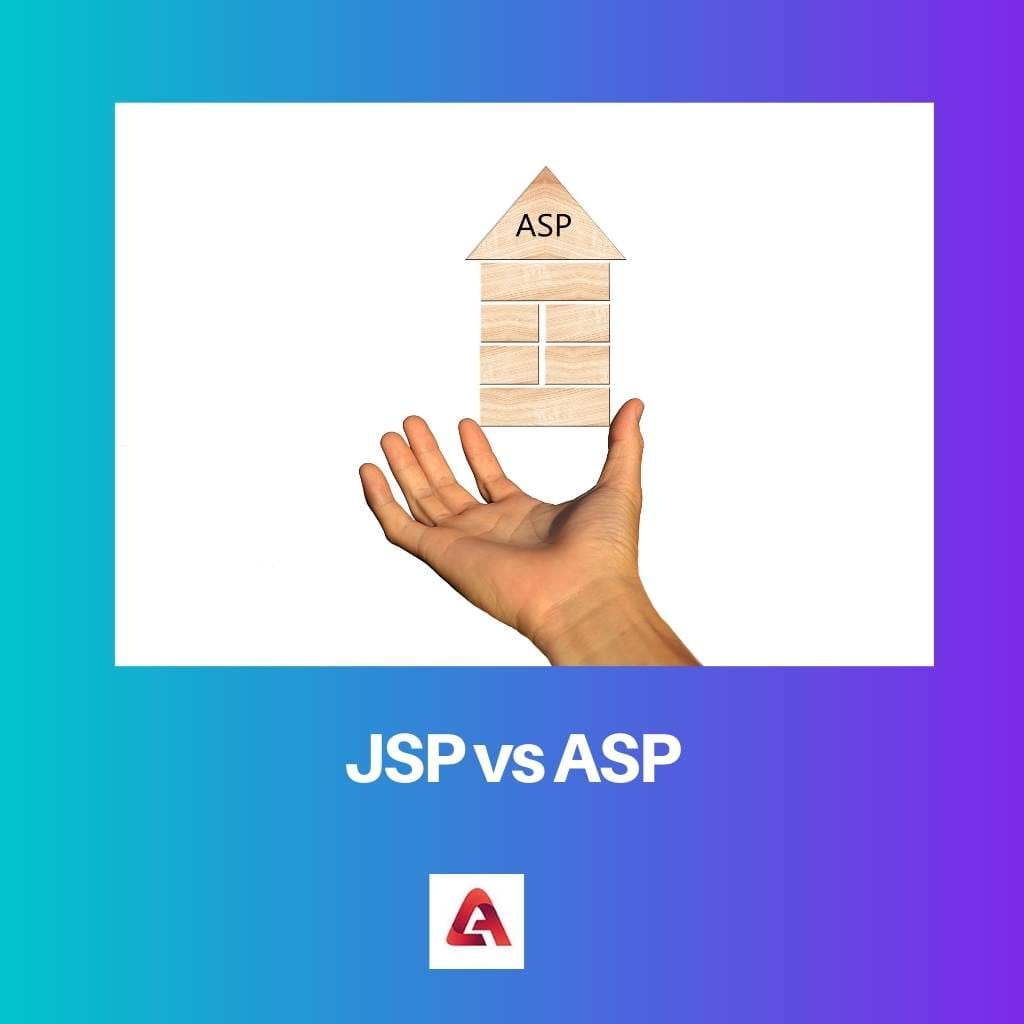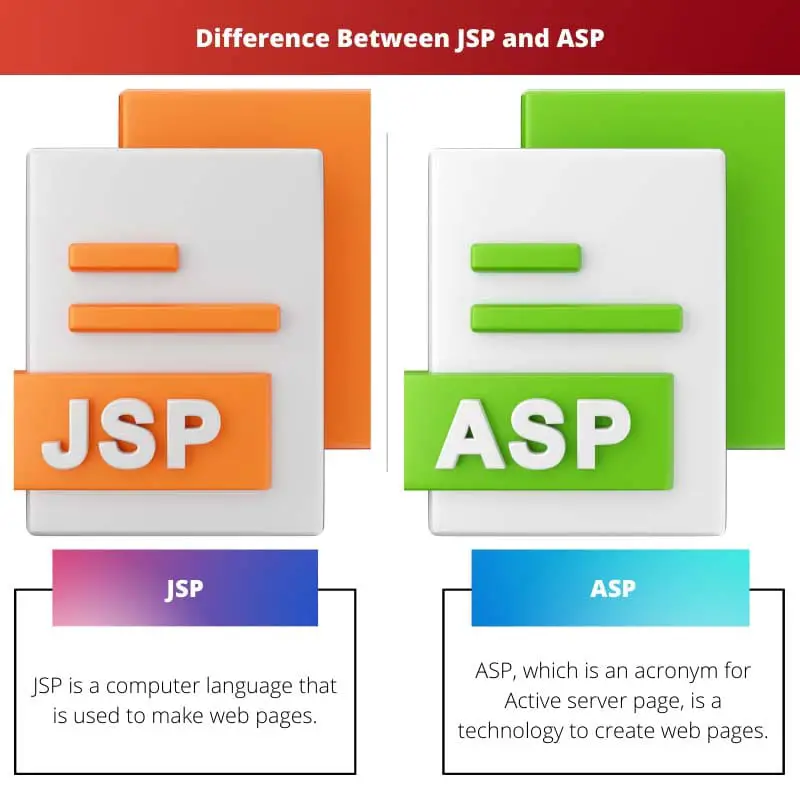With technology being upgraded every day now, especially for modern electronic devices, people are getting more and more information about the concepts that make the Internet what it is today.
They want to know the basics and the working of things and the components that make the net reliable and help in overall web development.
JSP and ASP are both types of technology used for web development. They are both server-side application programs. Though people may get confused between the two languages as their concepts are similar, though there are some features that make them different.
Key Takeaways
- JSP is a Java-based technology used for dynamic web page creation, while ASP is a Microsoft technology used for creating dynamic web pages.
- JSP pages are compiled into Java servlets before execution, whereas the server interprets ASP pages at runtime.
- JSP is platform-independent, while ASP is limited to Windows operating systems.
JSP vs ASP
Java Server Pages (JSP) is a technology used for developing dynamic web pages based on HTML/XML and is language-independent. Active Server Pages (ASP) is Microsoft’s technology for server-side scripting that enables embedding scripts in HTML pages to create dynamic web pages, primarily using VBScript.

JSP is an acronym for Java server pages. It is basically a technology that makes the code in a computer compatible with the net. It is one of the most used programming languages by coders.
It has many pros and protections. For example, This language-creating program has inbuilt memory leak protection as well as inbuilt security protection.
ASP is a platform-dependent program, meaning it. It uses either JScript or VBScript, and one of the best things about this particular language is that any browser can work with ASP pages. ASP, or Active server pages, run on IIS, which is an Internet information server.
Comparison Table
| Parameters of Comparison | JSP | ASP |
|---|---|---|
| Abbreviation | Java server pages | Active server pages |
| Extensions | .jsp | .asp |
| Independent platform | Yes | No |
| Created by | Sun Microsystems | Microsoft |
| Costs | JSP is free to use. | Costs are required. |
| Supporters | JSP can support many popular platforms like Windows O/S, Mac O/S, etc. | Only supported by Microsoft. |
What is JSP?
JSP is a computer language that is used to make web pages. As cleared by its full name- Java server pages- this scripting language’s program is based on Java.
A Java compiler is used to get “servlets”. Servlets are a type of Java code that can accept all protocol requests. In fact, JSP itself is an extension of Java servlets.
JSP is quite easy to maintain. The code for these pages runs faster as well, and the code from the program of the pages is compiled during run time.
It is not popular among Windows users but is supported by Apache Tomcat web and Linux-based servers. One would find working on Linux easier than on Apache Tomcat.
Though it has many advantages, just like any program, it has some disadvantages as well, that are: The difficulty in debugging and one has to have knowledge of Java in order to use JSP if they want to program the coding effectively.
What is ASP?
ASP, which is an acronym for Active server page, is a technology to create web pages. It was first established in 1998 by Microsoft, which is the provider of this language.
The technology transforms HTML pages into interactive web pages. It was the first of its kind and the first server-side scripting language.
An ASP page would mainly contain three things: Client-side code: The client waits for the server to start by sending signals to it. Server-side code: A statement would be required to execute it as it is a unique identification.
A certain tag(s) would be used for comments, one for an individual comment and another for multiple comments, and lastly, HTML tags are the main components that make the root of any document.
There are two files made in ASP. One for designing and one for coding. One can add HTML pages, Scripts, and ActiveX server components in the program to make the web pages dynamic.
And it is seen that sites made on ASP are cleaner, but the pitfall is that, unlike other free language programming technologies, it is not free to use. A certain amount has to be paid. A bit of a downfall would be that error handling is quite difficult in an ASP code.
Main Differences Between JSP and ASP
- It is seen that JSP is better at security in comparison to ASP. JSP comes up with better-inbuilt security.
- JSP code is compiled. On the other hand, ASP cannot be compiled. It is interrupted by the server. It is also known that JSP scripts execute faster than ASP ones.
- Microsoft produced ASP, and it is still used by them. JSP, in comparison, was made by Sun Microsystems but is now distributed by Oracle.
- JSP is free to use, and on the other hand, there are costs for the use of ASP.
- JSP is platform-independent. That is, it can run on many software. While in comparison, ASP is platform-dependent. It is a disadvantage since it will only work on a particular platform and not multiple operating systems.

References
- https://books.google.co.in/books?id=3QJVAgAAQBAJ&printsec=frontcover&dq=jsp+and+asp&hl=en&sa=X&ved=2ahUKEwi448-_zsfwAhVLfisKHbEuBiEQ6AEwAnoECAEQAw#v=onepage&q&f=false
- https://ieeexplore.ieee.org/abstract/document/1684998

The overview of the main differences between JSP and ASP provides a comprehensive understanding of their key distinctions. It’s interesting to learn about their error handling capabilities and security features.
Yes, the article does a great job of highlighting the pros and cons of JSP and ASP. It’s valuable information for anyone interested in web development.
The breakdown of JSP and ASP in the article is intellectually enriching. The detailed explanation of their server-side code and components is very informative.
The comparison of JSP with ASP based on their advantages and limitations is highly informative. It’s an excellent guide for understanding their functionality.
I agree, the article provides a comprehensive analysis of JSP and ASP, offering valuable insights into the workings of these web development technologies.
The details provided about JSP’s memory leak protection and ASP’s compatibility with different browsers offer a deeper understanding of their capabilities. This article is a valuable resource for learning about web development technologies.
This article provides a comprehensive overview of JSP and ASP, highlighting their unique features and functionalities.
I found the breakdown of the advantages and limitations of JSP and ASP very informative. It’s a great resource for understanding their differences.
The detailed comparison between JSP and ASP offers an insightful perspective on their varying capabilities. It’s important information for those interested in web development.
I agree, understanding the advantages of JSP’s security features and ASP’s compatibility with different platforms is valuable for developers.
The in-depth examination of JSP and ASP functionalities is enlightening. This article offers a comprehensive understanding of these web development technologies.
The comparison table is very helpful in understanding the distinctions between JSP and ASP. It’s informative to know about the platform independence of JSP and the cost differences between the two technologies.
I found the section on the file structure and components used in ASP very informative. It provides a good understanding of how ASP produces dynamic web pages.
Yes, the platform independence of JSP is definitely an advantage. I appreciate the clear breakdown of their differences.
The section on the Java compiler used in JSP and the transformation of HTML pages into interactive pages through ASP is enlightening. It’s great to learn about the inner workings of these technologies.
I agree, the in-depth explanation of the functionalities of JSP and ASP is very informative. It provides clarity on the technical aspects of web development.
I appreciate the detailed comparison of JSP and ASP. The overview of their key differences and functionalities is informative and enriching.
The explanation of JSP being a Java-based technology and ASP being Microsoft’s technology is clear and concise. This article provides valuable insights into both programming languages.
I agree, the article’s breakdown of JSP and ASP is well-detailed and informative.
It’s fascinating to learn about the advantages and disadvantages of JSP and ASP. This article provides a comprehensive overview of these web development technologies.
Thank you for the detailed explanation of JSP and ASP. It’s interesting to learn about the differences and benefits of these web development technologies.
I agree, it’s important to understand the distinctions between different programming languages. Great article!
The explanations provided about JSP and ASP are thorough and informative. It’s a valuable resource for those looking to understand the underlying technologies of web development.
The article provides an insightful comparison of JSP and ASP, offering clear details about their features and capabilities.
The breakdown of JSP and ASP in this article is highly informative, presenting a comprehensive analysis of their functionalities and benefits.